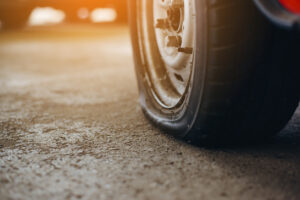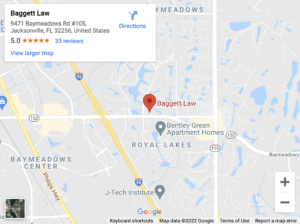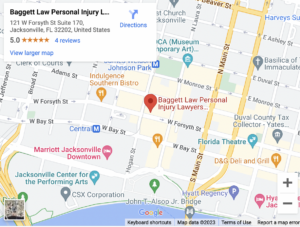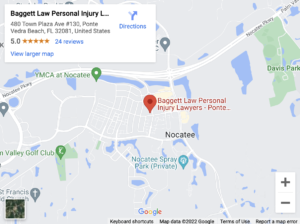
Have you been seriously hurt in a car accident in Jacksonville, FL, that you suspect was caused by a defective tire? Common signs of a tire defect include uneven wear, cracking or bulging, excessive vibration, and air loss.
Bad or dangerous tires can cause sudden blowouts, reduced traction, increased stopping distance, and a higher risk of hydroplaning. All of these problems can result in a potentially serious accident.
A Jacksonville personal injury attorney can help you hold the manufacturer and others liable for tire defects through a product liability or negligence claim. Since 2012, Baggett Law Personal Injury Lawyers has helped accident victims and families seek justice and fair compensation.
Contact our law firm today at (904) 396-1100 for a free consultation with a Jacksonville defective tire car accident lawyer to explore your legal rights.
How Our Personal Injury Lawyers Can Help You After a Defective Tire Car Accident in Jacksonville, FL

Personal injury cases involving defective or dangerous products are complex. You need an experienced Jacksonville personal injury lawyer to investigate your crash, determine how it happened, and navigate the complicated landscape of product liability law.
Baggett Law Personal Injury Lawyers has recovered tens of millions on behalf of our clients in Jacksonville, Florida. We have more than 100 years of combined experience in personal injury law, including product liability and car accident claims.
Our Jacksonville car accident lawyers have received prestigious recognition as Top 100 Civil Plaintiff Trial Lawyers in Florida by National Trial Lawyers and Super Lawyers since 2009. We have also earned the Martindale-Hubbell 2021 Platinum Client Champion Award.
When you hire our law office, we will:
- Conduct an independent investigation into your crash
- Identify parties who may share liability
- Work with experts to prove product defects and your damages
- Calculate the value of your case
- Build the strongest case possible under the most appropriate legal theory
- Handle all negotiations and protect your best interests
- Pursue a fair settlement agreement that fully compensates you
- Present your case in court if necessary
We are ready to give you the tireless representation you deserve. Contact our law office today to schedule a free case review with a Jacksonville car accident attorney. We will help you understand your options and what to expect going forward.
What Are Common Types of Tire Defects?
Sudden tire failure can be frightening and even deadly. In a recent year, 622 fatalities in the U.S. resulted from tire-related accidents. These crashes were caused by everything from tire blowouts and flats to manufacturer defects. A tire defect or failure increases the risk of a rollover accident, one of the deadliest types of collisions.
Tire defects can involve anything from material defects and construction flaws to improper mounting.
Common types of defects include:
- Separation of the tread and steel belt
- Tire tread separation
- Improper curing and molding
- Inferior materials that degrade too fast or do not perform properly
- Faulty belt design
- Extrusion defects
- Contamination in the materials
- Inner liner separation or cracking
- Misaligned steel belts
- Rapid or irregular wear caused by a mechanical defect
- Incorrectly sized tires
- Improper tire mounting
- Poor patching or repair
Defective tires can shred or blow out too easily, causing you to suddenly lose control of the vehicle. Any of these defects can lead to sudden and premature tire failure.
What Causes Dangerous Tire Defects?
Tires can be dangerous due to design or manufacturing defects before they even reach a consumer. They can also become defective due to age, mechanical issues, improper use, or improper repair or mounting.
Tire Manufacturing Defects
Defects may occur in many ways during the manufacturing process. These defects can make a tire inherently unsafe. Poor quality control, insufficient tire bead preparation, or improper curing or compounding are examples of manufacturing defects.
Sometimes, tires are produced with old or low-quality materials. Mistakes during curing can cause contaminants to enter the tire. The rubber used in tire production must be vulcanized, a process that strengthens and hardens the rubber. Using petroleum-based products before vulcanization or allowing the rubber to be imprinted with the liner pattern can cause poor bonding or tire failure.
Tire rubber must be cured for the proper amount of time at the correct temperature to ensure proper binding of the materials. Curing that is too short or too long, or at a temperature that’s too low or too high, can cause binding issues and premature failure.
Tire Design Defects
Some defects begin before a tire is even made. When tires aren’t designed to meet Federal Motor Vehicle Safety Standards (FMVSS), they can fail prematurely and/or shred or separate easily.
For example, inner liners keep air from escaping while preventing moisture from entering the interior of the tire. The main component is Halobutyl. While effective, Halobutyl is expensive, and some manufacturers have reduced the amount by design. This can reduce durability and increase the risk of tire failure.
Another example is defective skim stock design. This structural element holds together other components of the tire like glue, fusing them together during curing. Manufacturers often use a proprietary formula for the skim stock. When the formula is insufficient, it causes premature failure. This often means an entire line of tires becomes defective with a high rate of premature failure.
Old or Expired Tires
Like all rubber-based products, tires degrade as they age. Even an unused tire that appears in great condition can be dangerous if it’s too old. An old or expired tire is prone to cracks and fissures that can cause tread separation.
Some manufacturers recommend replacing tires when they are six years old, regardless of tread depth. All tires are marked with a manufacture date on the sidewall.
Overinflated or Underinflated Tires
When tires are overinflated, they are more prone to damage and more likely to have a blowout. When tires are underinflated, the sidewall has too much flex, overheating the tire and causing premature degradation and separation.
Mechanical Problems With the Vehicle
Sometimes, tire failure is caused by defective vehicle parts or poor maintenance. Misalignment or worn shocks and struts in the car’s suspension system are common causes of accelerated, uneven tire wear. These issues can also cause defects like cupping and scalloping in the tires and tread separation.
Poor Tire Installation or Repair
Tires can be dangerous when they are damaged by improper repairs or mounting. Failing to tighten lug nuts, incorrect tire size, or poor patching can also affect tire performance and cause accelerated wear or even a blowout.
Who Can Be Held Liable For a Defective Tire Car Accident in Jacksonville, Florida?
Depending on the cause of a tire defect, many parties may be liable for damages after an accident.
Potentially liable parties include the following:
- Tire manufacturers, distributors, and suppliers: Florida law holds manufacturers and other parties strictly liable for design and manufacturing defects. A claim can also be brought due to negligence or breach of warranty.
- Tire shops: Shops can be legally responsible for selling old tires as new and for improper installation or mounting.
- Mechanics: Repair shops and mechanics can be liable for improper repair or installation that causes a dangerous condition or defect.
- Car dealerships: A dealership can be held liable for causing defects or selling a vehicle after a recall has been issued for the tires or any other part of the car.
- Rental car companies: In some cases, rental agencies can be liable if they knowingly rented a vehicle with defective tires or failed to take reasonable action to detect defects or dangers.
If the tires were dangerous due to manufacturing or design defects, the legal theory of strict liability may apply. This means the manufacturer can be held accountable for your damages even if they were not careless or negligent.
Other parties may be liable for negligence in the sale, handling, storage, inspection, repair, or installation of tires. Negligence can involve causing a dangerous defect or failing to take reasonable action to avoid or detect defects.
Schedule a Free Consultation With Our Jacksonville Defective Tire Car Accident Lawyers
Have you been hurt in an auto accident in Jacksonville, FL, due to defective tires? You may be entitled to money for your losses. Baggett Law Personal Injury Lawyers is here to help you pursue the fair compensation you deserve.
Call our law office today to schedule a free initial consultation with a Jacksonville defective tire car accident attorney to discuss what we can do to help you.
Visit Our Car Accident Law Office In Jacksonville, FL
Baggett Law Personal Injury Lawyers
9471 Baymeadows Rd #105, Jacksonville, FL 32256
(904) 396-1100
Open 24 hours





